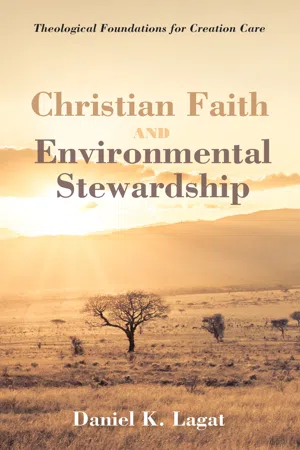![]()
Chapter One
Introduction
Christianity and Environment
The main ingredients of an environmental ethic are caring about the planet and all of its inhabitants, allowing unselfishness to control the immediate self-interest that harms others, and living each day so as to leave the lightest possible footprints on the planet.
—Robert Cahn
The culture-ideology of consumerism proclaims, literally, that the meaning of life is to be found in the things that we possess. To consume, therefore, is to be fully alive, and to remain fully alive we must consume.
—Leslie. Sklair, Sociology of the Global-System, 47–48
The role of religion in human development has been a subject of scrutiny for many scholars. According to Gerrie Ter Haar and Stephen Ellis the question of whether religion has an impact in the development of any nation has been answered in the affirmative. The United Nations Development Program asserts that the process of human development should “at least create an environment for people, individually and collectively, to develop to their full potential and to have a reasonable chance of leading productive and creative lives that they value.” Religion contributes in creating this environment in a variety of ways, as will be discussed in this book. Although in some countries in Africa religion has been seen to support terrorism and, in the process, hampering development, this has not tainted Christianity in Kenya in any significant way. Religion has contributed immensely in the development of health sector, education, and cultivation of the culture of hard work. In Kenya, many schools were originally founded by churches, institutions that have produced the current leaders in the society. Christianity has been energetic in humanitarian activities, peacekeeping, HIV/AIDS response and other similar roles.
According to Presbyterian Eco Justice Task Force, far more disastrous than the problems that the Church has handled in the past, are issues of climate change and environmental degradation. The Task Force observes:
Eric Rignot and Pannir Kanagaratnam in reference to climatic change, observe that global impacts in areas such as damage of the ozone layer have left consequences such as enormous temperatures on earth that have made some parts of the universe gradually uninhabitable. As a result, heads of states have often converged to deliberate on measures that need to be taken to reverse the situation, or at least contain it.
In Africa, climate change damages have left devastating effects, especially because in most parts of Africa, the economy is largely nature-based, and because Africans are less able to cope or adapt to climate change than other continents. The fact that Africa has contributed the least in inducing climate change makes the circumstance an unfair treatment to the continent. Reid Basher and Sálvano Briceño contend:
As noted above, Africa’s vulnerability is closely tied to desertification in the continent. Deserts, arid, and semi-arid regions are possibly the most food insecure places. The effect of the advancing desert from Somalia, which is sweeping through the entire north and eastern Kenya is threatening the people living in the country. While education and development are the priorities of many countries in the world, Kenya is facing a situation where food and water for domestic use become the main concern, for they are perpetually becoming unavailable. Kenya’s five major water towers are on the verge of collapse, with snowy caps of mountains such as Kilimanjaro, Kenya, Ruwenzori, and Elgon, now melting at a rate never recorded before in history. According to Russell et al (2009), these mountains have lost over 80 per cent of their surface area between 1900 and 1990, and now only a total of less than 10km2 is remaining.
The impact of climate and environmental deterioration means that Kenya has become and may continue to be food insecure. Jessica Leber notes: “experts predict climate change will increase Kenya’s already tough food security challenges.” The country now imports some of its food, yet the people are poor, and the government economy is majorly supported by taxes. It is gradually becoming normal to see people in many areas walking for long distances in search of water, food and pasture, sometimes moving with children and animals. In many parts of the country, violence has erupted several times because communities are fighting for natural resources such as water and pasture, which are now limited. Even the elaborate traditional mechanisms for coping with a harsh environment have been overwhelmed and that life for many millions has become a “little more than a form of chronic disaster.”
Prevalent poverty and dependence on rain-fed agriculture has further exacerbated vulnerability in Kenya. Even in the rare instance of normal rainfall, Africa fails to produce enough food to meet its needs, leading to chronic food insecurity and overdependence on emergency food relief (as cited in Luganda, 2008). In fact, the World Bank estimates that by 2080, “African agricultural output could fall by 16 percent.” Farmers are the first and directly affected in the country. Jessica Leber observes that the “rising global temperatures are ending what little predictability farmers could count on in the past. . . Farm...
